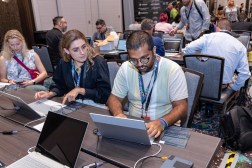New blockchain group aims at ‘ecosystem for the second internet’
One of the reasons the internet has remained open is the ecosystem of self-governing multi-stakeholder groups that sprung up around it — to develop technical standards, administer vital infrastructure like the Domain Name System and generally nurture and maintain the worldwide community.
Now, blockchain enthusiasts — who believe the technology has the potential to flower into a “second internet” — want to get started on a similar ecosystem for distributed ledger technology.
The Muskoka Group — named for the bucolic Canadian lakeside resort where it was founded last month — aims to start that work. Founder Don Tapscott told Cyberscoop he convened its members in just “two or three weeks.”
The ability to bring such a “high-powered” group together so quickly was “reflective of … the strong sense that there is much work to be done to build an ecosystem for the second generation of the internet,” he said.
“Everyone in that room came with their own particular passion,” added Muskoka Group member Jamie Smith, global chief communications officer for the Bitfury Group. “I am entirely focused on communications … everyone is working together” to help realize the enormous potential of the blockchain.
Other group members include Brian Behlendorf, founder of the Hyperledger Project, Perianne Boring, founder and president of the Chamber of Digital Commerce and Jim Zemlin, executive director of the Linux Foundation.
Tapscott, a consultant and co-author of “The Blockchain Revolution,” believes that distributed ledger technology will be the basis for a second internet — an internet of value, rather than of information.
Blockchain, the technology underlying the bitcoin digital currency, uses encryption and distributed computing power to create a constantly updated and cryptographically secure ledger, or record of transactions that’s distributed among all its participants.

Don Tapscott, author, consultant and co-founder of the Muskoka Group (Source: Don Tapscott)
Banks have already begun studying how blockchain can be used for interbank settlements, for instance.
“Important resources, from conflict diamonds, to old growth forests to the internet itself can be stewarded and governed not by states, not … by corporations, but by … self organizing networks,” said Tapscott.
Last month, the World Wide Web Consortium, the non-profit whose members develop the technical standards that keep the internet open and accessible, said it would look at possible standards for blockchain interoperability.
But standards are only one piece of the puzzle, said Tapscott.
“We have to fill the gaping hole in the knowledge and know-how about how to build a healthy ecosystem,” he said.
“We’re not trying to declare ourselves the new leaders of the blockchain, far from it,” he added of the Muskoka Group. “We’re just people who understand that decentralization doesn’t mean disorganization … We’re self-organized.”
He said the group’s first project would be an “online knowledge hub,” bringing together all the know how about the 60 or more early stage applications for the new technology.
Smith stresses that the new technology is at the very beginning of its development.
“When you ask people who were involved with the first internet ‘Where are we now with this second generation?’ No one gives a date later than the early 90’s [before Amazon, before streaming video, before social media]… It’s still incredibly early days.”
But the right guy is in the driver’s seat, she believes. Tapscott “is the Yoda of the blockchain … a seasoned communicator, a wise man,” she said.






